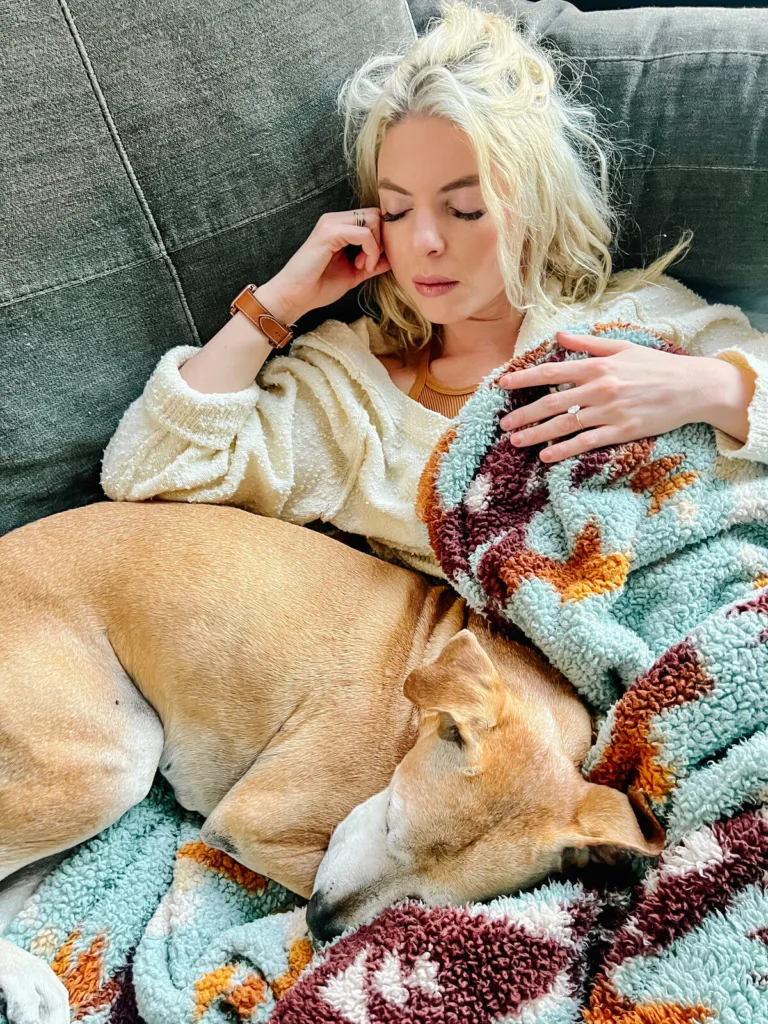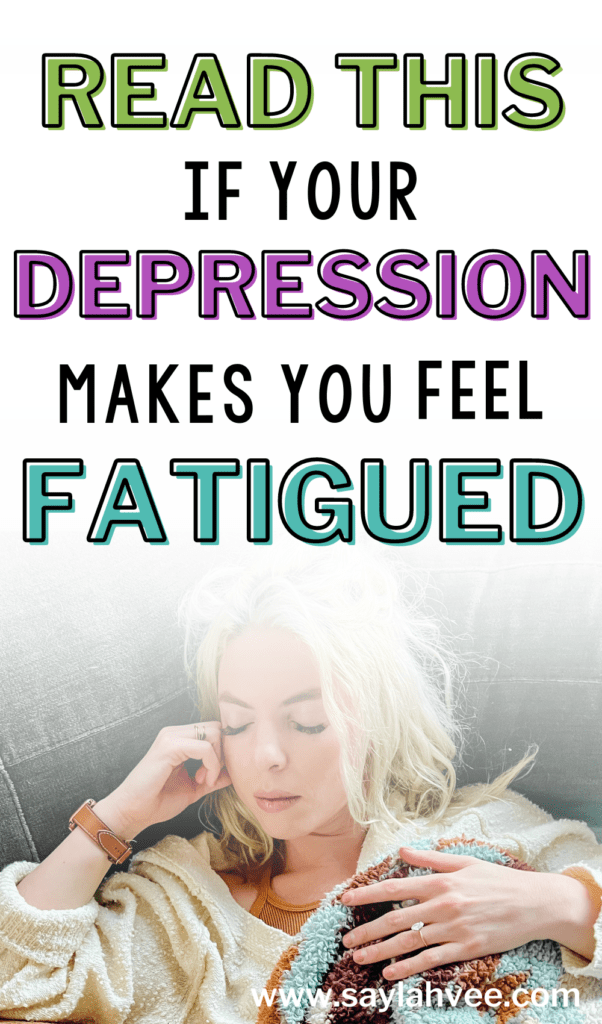13 Nov Does Depression Make You Sleepy or Fatigued? How to Cope
*disclaimer: this post may contain affiliate links and mental health triggers… and it will definitely contain curse words, hard truths, hope, inspiration, and love
If you’ve struggling with your sleep and have been asking yourself “does depression make you sleepy, tired, and fatigued?”… I’ve got your answer!
Here’s the deal. When we are depressed AF and dealing with major depression, mental illness, feelings of sadness, seasonal affective disorder, bipolar disorder, or just straight up having a hard time in general… our sleep is impacted. HARD.
Which kinda sucks because getting enough sleep is really important for a lot of aspects of our life and mental health journey. Like, basically all of them.
Getting a good night’s sleep has a direct impact on your mental health conditions, emotional health, and physical health. When your sleep quality is anything but stellar, you have an increased risk of experiencing mild, major or severe depression symptoms. But also, our depression symptoms make it really hard to get quality sleep.
Basically, it’s a vicious cycle.
So, does depression make you sleepy and fatigued, you ask? Why yes, yes it does! But also, your lack of sleep is heightening your depression. Which is then heightening your lack of sleep. Cool, cool.
But the good news is, this is attainable to manage and possible to overcome. So today we are talking about how fatigue and depression go hand in hand and how to cope with them.

Table of Contents
ToggleLet’s Talk About Symptoms of Depression
Why does depression make you sleepy? Whether you are going through a season of depression or you have been living with major depression (major depressive disorder), the symptoms of depression suck and come with a whole long list of side effects.
While the way depression impacts sleep or vice-versa is definitely a frustrating chicken and egg situation, most research states that it makes most sense to dig into and try to work through your depression first, which then will most likely alleviate your trouble with sleeping and symptoms of fatigue – or at least narrow down the root of the problem.
I’m not a doctor or anything… just a gal with a lot of experience living with major depression and insomnia… but I say, do whatever works. If you find some way to get too sleep before you find a way to manage your depression… go for it! Because as I said earlier, the whole sleep and depression dance is a chicken and egg situation. So if you fix one side of the equation, the other might follow suit. But again, I’m not a doctor.
To fully understand this chicken and egg situation, let’s dig into the side effects of depression that most impact our sleep.
Why Does Depression Make you Sleepy?
Below I’ve listed some of the most common reasons and correlations to how depression might be impacting your ability/inability to sleep or feelings increased sleepiness due to the natural side effects and symptoms of depression.
Loss of Interest
Typically, a HUGE thing that impacts people when they are struggling with depression is their loss of interest.
Did you know there is actually a medical term for losing interest? It’s called anhedonia and it’s a symptom of major depression. It’s thought that anhedonia has a direct correlation with brain activity and low serotonin levels. Which makes sense if you think about it.
Depression decreases serotonin, and lack of serotonin makes you lose interest in life. This can impact your sleep by creating an overwhelming sense of lethargy with the lack of stimulation in your mind and your body due to the result of losing interest in life.
Low Motivation
When you have no interest in life, you end up having a lack of motivation. Because like, you’re not interested in anything so why would you be motivated to do anything?
Make money?
‘I don’t care if I live or die, so why even go to work?’
Hang out with friends?
‘I don’t want to have conversations with people. I’m staying home.’
No clean laundry?
‘Great excuse to not leave bed today!’
Pants getting too tight?
‘Whatever, pass the ice cream while I order bigger pants because, who cares? I don’t!’
**gets to the checking out part and realizes credit card is all the way in the kitchen**
‘Fuck it, I don’t need pants!’
When we are depressed, our loss of interest feeds our loss of motivation… which could be a result of lack of energy due to fatigue.
Lack of Energy
Depression has this weird way of making us feel exhausted whether or not we got 2 hours of sleep or 12 hours of sleep. The extreme low energy that we feel while depressed is due to shifts in our brain activity when going through depression.
Weight Gain or Loss
Feeling depressed impacts the way we eat. And sometimes the amount of food we have or don’t have in our bellies can mess with how we are sleeping.
If depression is impacting us in a way that makes us overeat, there is a good chance you are eating foods that are preventing you from falling asleep. And of course, the way you are eating is probably not the main factor when it comes to your sleep or lack thereof – it’s probably worth taking a look at.
Small things add up and build on top of the other, so every little bit counts when it comes to our depression. It’s important to have all around awareness of where we can make small changes to help our sleep and how we eat may be one of them.
On the flip-side, increased feelings of hunger make it hard to fall asleep because your brain is telling your body it’s hungry and wants to be fed. But your body doesn’t want to be fed because it’s depressed AF.
Sleep Disorders
And finally… last but not least on this list of depression symptoms that impact sleep… We are taking a look at sleep disorders. And while a sleep disorder can be a side effect of or exacerbated by depression or chronic stress… there’s also a chance they are isolated. So just keep that in mind.
Yes, there’s a chance your depression is what’s making you sleepy and fatigued. But it also could be a sleep disorder. Or both.
While I am not listing all of the sleep disorders that can be impacting depression or an impact of depression, I wanted to quickly touch on a few common ones so you can see if there is reason to explore these any further or even seek medical attention in hopes of supporting your sleep and depression.
Chronic Fatigue Syndrome
Chronic Fatigue Syndrome, aka myalgic encephalomyelitis is a complicated medical condition that involves extreme, unexplainable, long term fatigue. The cause of CFS is unknown. Some doctors think it’s a result of viral infections, others think it stems from psychological stress, and there are also doctors who think it could stem from a mix of both.
Symptoms include fatigue, problems with memory or concentration, sore throat, headaches, enlarged lymph nodes in your neck or armpits, unexplained muscle or joint pain, dizziness that worsens with moving from lying down or sitting to standing, unrefreshing sleep, and extreme exhaustion after physical or mental exercise.
Insomnia
Insomnia is linked to depression because of the way it impacts our sleep. When someone struggles with insomnia, they have a hard time falling asleep and/or staying asleep. This inability to get good rest throughout the night, results in fatigue… which results in lack of motivation, interest, and energy levels, with an increase in depression.
Depression and insomnia are a great example of one of those chicken and egg situations where your insomnia is heightening your depression but your depression is heightening your insomnia.
Obstructive Sleep Apnea
While obstructive sleep apnea is not a side effect of depression, depression can be a side effect of OSA. Obstructive sleep apnea is a super common medical condition that affects about one billion adults world wide. It’s basically this really annoying condition that causes sleep disturbance by affecting one’s ability to breathe while they sleep.
Someone who has OSA experiences an obstruction to the airway that allows them to breathe while sleeping. The airway narrows or collapses as you sleep which obviously causes you to wake up each time you can’t breathe which creates disruption and the inability to get enough rest.
OSA is a sleep disorder that can contribute to your depression as well as make you sleepy and fatigued due to constant waking up throughout the night which causes a lack of sleep.
Chronic Illness
Chronic illness and chronic pain are characterized as conditions that can be controlled but not cured. Chronic illnesses can include but are not limited to heart disease, stroke, lung cancer, colorectal cancer, depression, type 2 diabetes, arthritis, osteoporosis, asthma, chronic obstructive pulmonary disease (COPD), chronic kidney disease, and oral disease, ALS (Lou Gehrig’s Disease), Alzheimer’s Disease and other Dementias, Crohn’s Disease, Ulcerative Colitis, Other Inflammatory Bowel Diseases, Irritable Bowel Syndrome, Cystic Fibrosis, Eating Disorders, Obesity, Reflex Sympathetic Dystrophy (RSD) Syndrome
Learn more about chronic illness and see if they are impacting your depression or ability to sleep here and here.
Chronic Pain
Chronic pain is pain that has lasted for a minimum of 3 months and impacts your day to day life. The impact on your day to day due to chronic pain is mostly what impacts your depression and inability to sleep.
A lot of chronic pain is a result of the chronic illnesses listed above but other sorts of chronic pain such as back pain, neck pain, headaches, migraines, testicular pain (orchialgia), lasting pain in scar tissue, muscle pain all over (such as with fibromyalgia), or even neurogenic pain from damage to the nerves or other parts of the nervous system can be isolated from chronic illness. And it can also be increasing your depression, sleepiness, and fatigue.
So…
Sensing a common theme here? Side effects of sleep disorders leave us feeling fatigued ALL. THE. TIME. And also have some kind of correlation to our mental health and/or depression.
If you’ve been struggling with sleep and find yourself constantly wondering “does depression make you sleepy and fatigued” the answer is definitely yes… but keep in mind there could also be other aspects of your life and health to explore if you are not sleeping well. So we should also probably dig into symptoms of fatigue and see if there’s anything not correlated to depression symptoms that you could potentially explore to help understand if depression is causing your sleepiness or something else. Or both.

Causes and Symptoms of Fatigue
There are A LOT of symptoms and potential causes of fatigue. And because of that, I am linking this article where you can do a deep dive. But the gist is that long term and unanalyzed fatigue is a big depression risk which contributes to irritability, mood disorders, loss of energy, loss of motivation, and lots of sleepless nights… amongst many other symptoms.
Some general symptoms of fatigue include muscle aches, headaches, irritability, vision problems, foggy thinking, difficulty concentrating, and apathy.
Fatigue can be broken down into physical fatigue and mental fatigue, but today we’re going to focus on mental fatigue… because this is a mental health blog. Duh.
But reeaaalllll quick! Here are a few physical related symptoms of fatigue to look at if any of the mental ones below are not hitting close to home for you:
Potential Health / Physical symptoms of Fatigue
The following are potential health / physical symptoms of fatigue:
Anemia, diabetes, high blood pressure, obesity, heart disease, chronic fatigue syndrome, weakened immune system function, thyroid problems, fibromyalgia, systemic lupus, rheumatoid arthritis, gastroesophageal reflux disease (GERD), inflammatory bowel disease, cancer and cancer treatments – including chemotherapy and radiation therapy, as well as massive blood loss, heart and lung conditions, cushing’s syndrome, kidney disease, electrolyte problems, pregnancy, and hormonal contraception, including birth control pills and the implant.
Potential Mental Health Related Causes of Fatigue
And finally, below are some of the most common mental health related causes of fatigue.
These all obviously go super hand in hand with depression… which is again this frustrating chicken and egg situation. It’s worth examining each of these aspects of fatigue to see if there are things you can try to positively impact those aspects of your fatigue which may be contributing to your depression.
Mental Health Conditions
Mental health conditions in general, not just depression, should be explored when digging into the question of ‘does depression make you sleepy?’. Yes depression can be making you sleepy, but there could be other mental health conditions contributing as well.
Other mental illnesses (I mostly just referencea depression and anxiety because that’s what I’m diagnosed with but other mental illnesses should be considered in addition to depression), high stress levels, bereavement and grief, eating disorders, anxiety, boredom, emotional exhaustion or burnout, and stressful life events, such as moving home or getting a divorce can all be contributing to your lack of sleep.
Side Effects of Medications
There is a good chance that your depression medication is impacting your sleep, which is insanely frustrating because your depression meds are supposed to be helping your depression. But your lack of sleep is hurting your depression. But you might not be sleeping because of your medication. I’m sorry, WTF??
Unfortunately, certain drugs and medications can cause fatigue. If you are taking any of these, you might want to talk to your doctor about how they may be impacting your sleep patterns. These include:
Some antidepressants, anxiety medications, antihypertensives, statins, steroids, antihistamines, and sedatives
How to Overcome Fatigue (or at least manage it)
So if I had to point out one common theme here in this post, it’s that depressed people generally experience poor sleep which makes them feel sleepy and fatigued.
Oftentimes, mental health conditions can be alleviated in time through hard work and utilizing outlets like talk therapy, cognitive behavioral therapy, and spirituality. But because we live in a world of instant gratification and no one has time to wait 3 months to maybe get better sleep, the best way to start digging in is by making some easy lifestyle changes that you can start trying today.
A lack of active lifestyle due to depression is a HUGE factor in getting poor sleep. It makes sense to start trying to overcome your poor sleep (which is most likely resulting in fatigue) by finding ways to tire yourself out during the day.
Yeah some of these suggestions might not work for you, and honestly some of them might be too hard to incorporate into your life depending on the severity of your depression, but it’s 100% worth a try to see if any of the tips below can help move the needle in the quality of your sleep.
And it’s worth mentioning.. You need to give these a try for at least a couple weeks before deciding if they work or don’t work for you. Participating in social activities or going for a 30 minute walk once is not going to do shit for your sleep. #justsayin
Daily Activities
If you are one of those people constantly talking about how there’s nothing to watch on Netflix and getting poor sleep, you need a hobby. Sorry to be blunt.
And I get it, when you are deep in depression.. You don’t want a hobby. Netflix is your hobby. But Netflix isn’t helping you get good sleep. It’s overstimulating for your eyes and mind, and it’s not providing anything physical or challenging. Physical activity and utilizing your brain both have a huge impact on tiring yourself out as well as on your depression in general.
Things to try:
- Reading in the park
- Pick up some kind of arts and crafts – coloring, paint by number, pottery, knitting
- Start a garden (if you’re anything like me, you’ll probs murder all of the plants but at least it’ll give you something to do)
- Cooking/baking
- Self care
Regular Exercise
Ugh, I know. I don’t like this one either. But there’s a bunch of scientific mumbo-jumbo that makes a good point about exercise helping our sleep.
According to the National Sleep Foundation, regular exercise improves sleep because it helps regulate your body’s natural sleep-wake cycle.
Now, I get it… there are a lot of things impacting our lack of regular exercise. Namely… being depressed AF and not having the motivation, interest, or energy to do life. So like, obvs it’s gonna be hard to exercise. This is where you need to push yourself or find someone to help hold you accountable.
Spending my entire life in clinical depression and going in and out of involuntary mental hospitals… I truly do understand how fucking annoying it is when someone says “well, just go for a walk”. NO. I’m sorry but when you are so depressed that you don’t want to live… there is nothing as simple as ‘just going for a walk’.
BUT, trust me when I say that the exercise piece is super important for your depression.
I’m at the point in my recovery where I don’t mind walks… but you better believe that anyone who suggested a walk to me while I was in the thick of my depression was able to simply FEEL how angry the suggestion made me by the complete shift in energy.
So I am going to give you some clinical depression approved alternatives to regular exercise if you are just not at the point of being able to go for walks. But also, if you can somehow convince yourself to go for a walk… go for a fucking walk. JUST DO IT.
Regular Exercise Ideas when Too Depressed to Exercise:
- Hula Hoop
- Mini Trampoline
- Jump Rope
- Walk a few flights of stairs every hour
- Walk in place while watching Netflix
- Do squats while brushing your teeth
Regular Exercise Ideas:
- Mindful Walks
- Bike Rides
- Swim
- Yoga
- Some kind of aggression busting class like JuJitsu
Healthy Diet
Your diet can have a HUGE impact on your sleep, and could actually be the root cause of your sleepiness and fatigue, rather than depression.
But like, between you and me… I’m not great at this part of the post. I have an unhealthy relationship with food and it’s one of the pieces of my mental health struggle that I’m working through every single day.
But I at least understand how having a healthy diet can impact both my sleep and depression… So I at least try. Sometimes. Maybe. Ish. Kinda. Can’t win ‘em all. Such is Life. Saylahvee.
The thought process here is that some foods, especially foods with excess sugar and fatty proteins are natural energy boosters and consuming them before bed can be keeping you awake.
Also, when talking through symptoms of depression above… We talked about how overeating or undereating could be impacting your sleep. Finding the right healthy diet can have a huge shift in your sleep. It’s also worth mentioning that some foods that are good for my body and sleep might be awful for yours because of how we are each chemically made up. So with that, it could be worth looking into an at home food sensitivity test that can help you identify what foods to eat more of and which ones to avoid.
So we’ve covered the question of ‘does depression make you sleepy and fatigued’
… and the answer is..
Yeah.. well, kinda.. for the most part.. indirectly..? …I guess? Probs check in with a doctor of some sort if you’ve been long term sleepy and fatigued.
It’s really hard to confirm whether or not depression directly does in fact make you sleepy and fatigued because there is so much medical unknown… but I can give you some concrete advice on how to sleep with depression so you can kick that poor sleep you’ve been receiving to the curb.. Check out this post… Can’t Fall Asleep? Try These 6 Tips if you’d like some support with sleeping while you work through finding your root cause of sleepiness and fatigue.
How do you feel? Let me know in the comments below!







Katie
Posted at 10:04h, 14 NovemberReally great, detailed post. For me, postpartum depression didn’t make me sleepy…it did the opposite and kept me up at night. My brain couldn’t shut off and it took me forever to fall asleep (which is no good with a baby, lol!). I think overall it depends on the person, but it’s important to be aware of it and figure out how to manage things. Thanks for sharing this!
Michelle
Posted at 10:18h, 14 NovemberThanks so much for sharing how depression has impacted you! I totally agree with you, depression definitely hits people differently. I think in general most people who struggle with depression feel a sense of overall lethargy or tiredness throughout the day because of, to your point, not being able to fall asleep at night / experiencing insomnia which creates a lack of good sleep and in turn can result in a feeling of tiredness throughout the day. Or even if they do end up sleeping 12 hours, still feeling exhausted due to lack of serotonin, good foods, over-sleeping, etc. Or because of the meds they are taking to feel mentally better, but the meds keep them awake. Either which way, I think most people who struggle with depression spend a lot of time feeling exhausted, whether or not they slept well, but I am so curious in how it impacts other people, aside from my own experiences and research. Mental Health is so interesting in the sense of how it hits people so differently, which is why I asked if others do feel that fatigue and exhaustion as well and I so appreciate you opening up and sharing your POV on how depression hit you.
Smiley
Posted at 12:45h, 15 NovemberUnfortunately, my pain is my sleep stealer. I have been on and off medication, even though I would rather if I wouldn’t have to take it, sometimes it’s the only thing that is helping. I find that my rituals such as relaxing before sleep, tens machine for my back and meditating, praying…all those are helping me. Thanks for sharing!
Jen
Posted at 06:31h, 30 NovemberAll of this is true. When my depression is bad, all I want to do is lay in bed. Some of that is because of a vitamin D deficiency also. Great tips and thanks for sharing!
AMANDA
Posted at 07:32h, 30 NovemberI love how informative you are in this post. You cover it all and you always add humour to your writing which is great!!! A super well done post that many can learn from.
Kirsten Smith
Posted at 08:45h, 30 NovemberVery informative. Thanks for sharing!
Traci Grossi
Posted at 09:44h, 30 NovemberGreat post. I hear ya! I suffer from depression and chronic pain. It is essential to keep moving daily by pushing yourself to get out for a walk in nature and take time for self-care. Not always easy but a sedentary life will affect your sleep.
Pastor Natalie (ExamineThisMoment)
Posted at 19:17h, 30 NovemberVery good read. Thank you for including how to management ideas such as daily exercise and diet. When you do not feel well your overall mental health can definitely be impacted.
Pastor Natalie (ExamineThisMoment)
Letstakeamoment.com